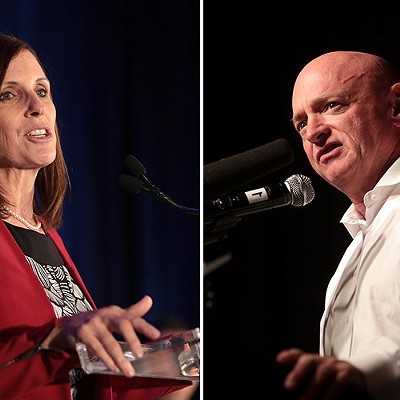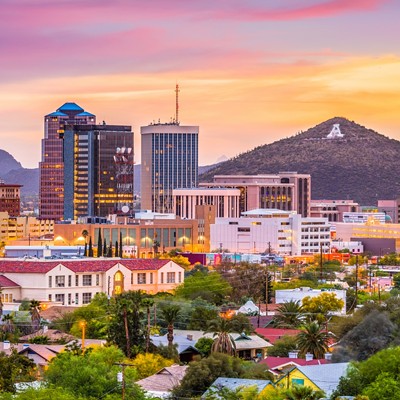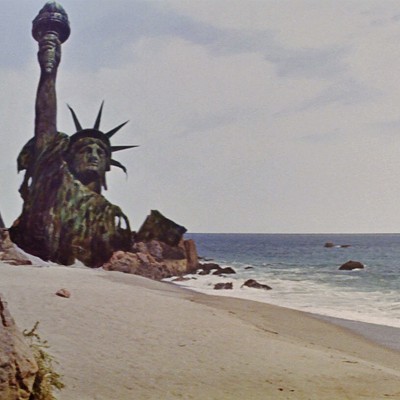He still has a day job. Only these days, it's in Tucson. Otherwise, Miller's old life is mostly reduced to a collection of signed photos, all from New Orleans musical royalty. They pepper a tall kitchen wall in the townhouse he shares with his wife, Darby.
For the couple, Hurricane Katrina was a brutish crescendo to that other world. "We lived right on Napoleon and St. Charles avenues," Miller says. As the flood waters rolled in, "we were down to one room in the house. We just about ended up in a tree like a lot of those other people."
Instead, they were bundled onto a National Guard flight bound for Tucson. Today, they're among about 300 New Orleans evacuees stitching new lives together in Tucson. But the past doesn't retreat so easily.
And while their experience here may highlight the tenacity of tragedy, it also reveals uglier aspects of our own city, riddled by crime and tone-deaf politicians.
On Christmas Day, their son was killed in Iraq. His picture joins the Miller's wall of memories.
This fall, steeped in grief, they talked about moving on with their lives. "I told Darby at breakfast, I said hopefully all the bad that's happened to us is finally behind us," Allan says.
That was on Oct. 7, Allan's birthday. There was a surprise party planned. Instead, the Millers were surprised by a burglary.
"We went down to the post office and dropped off some mail," he says. "I stopped at Safeway, and was probably there about 10 or 15 minutes. When we came back, our front door was open. My wife's computer and the receiver for our home theater were sitting outside. My wife had a little bank with a bunch of change that we saved for grandchildren's birthdays. And that was gone.
"The guy had actually ripped the iron bars off the back of our bedroom window, and then threw a rock through it." He frowns at the window, now patched with plywood.
Allan says it's just one face of decay in his neighborhood, just off St. Mary's Road near "A" Mountain. Other faces are those of the homeless, who harass his wife when she goes to Safeway. Not long ago, she passed a guy masturbating near the grocery store parking lot. Another day, she walked past a junkie, just a block from her home, standing by the curb with a syringe in his arm.
"He started cursing at me," says Miller, a retired Navy nurse who doesn't ruffle easily. "I just told him, 'Adios, amigo,' and I kept walking."
Then there was the beggar who reached in Allan's truck window, grabbing him by the throat at a stoplight near Interstate 10.
Taken together, these incidents were taking a toll. So the Millers tried talking to José Ibarra, their Ward 1 city councilman, about the plight of their neighborhood, about the crime and graffiti and drugs. But they never get a reply to their calls and e-mails. "We've gotten absolutely no response from him at all," says Allan.
He almost misses the rotten but clear-cut corruption of New Orleans. "Where I'm from, you have to pay your politicians to shake their hands," he says. "I'm starting to wonder: Is this going to be like New Orleans? Am I going to have to go down and pay the guy to get his attention?"
Councilman Ibarra didn't return several calls from the Tucson Weekly.
This all leaves the Millers in a quandary, barely more than a year after they landed in Tucson. Should they move away, to somewhere else with less crime and official indifference? Or should they stay, and try to sink deeper roots?
Such questions run deep and wide, according to Dr. Ronald Kessler, a professor of health care policy at Harvard Medical School, and director of the Hurricane Katrina Community Advisory Group.
While all catastrophes share key aspects, he says the enormity of New Orleans' destruction raises the bar for survivors. "Usually when we have some disaster in our lives, we have still have something that's a secure base, a touchstone." But after Hurricane Katrina, many "have lost all the anchors. They've lost their jobs; they may have lost a loved one, and they're living in a new town where they don't have their friends.
"That's what makes it so terrible, because there are very few events in life where people lose absolutely everything."
It's a perfect recipe for the anxiety common among the hurricane's survivors, he says. "They have so much uncertainty in their lives. They just worry themselves to death. They're jumpy. We also see major depression and post-traumatic stress disorders."
None of this is a great surprise. "It does fit into the pattern of other disasters," Kessler says. "But (Katrina) is much bigger, so we have more people who've had these experiences. Time will tell, but our fear is that the effects are going to last longer, because a lot of these problems get resolved when a situation gets resolved."
(In this case, New Orleans is nowhere near recovery. And the Millers aren't holding their breaths. They returned several weeks after the disaster, "and nothing had been done," Darby recalls. "It was like a human dump there, it smelled so bad.")
That uncertainty can stand in the way of moving on, says Dr. Kessler. "When these other aspects of your life are up in the air, it's hard for people to come to some sort of resolution."
He says it also makes it harder for survivors to grow new roots. "We know that a lot of the people who have moved to other places, to other parts of the country, say they don't think they are going to stay there."
Surviving one big disaster is enough, says Allan Miller. Add a string of tragedies, and it's overwhelming. But parsing out their own pain from the troubles of Tucson isn't that difficult.
He glances at the wall of photos, perhaps considering a few souvenirs from this new life. But so far, there aren't many he hopes to keep. "Katrina brought us here, and we've come through a hell of a lot," he says. "We came with one suitcase each. We've never asked for anything from this community, and I guess I could be happy here. But I can't put up with much more."
Darby sighs, and leans back on her couch. "I thought Tucson was going to be a nice place to live," she says. "I don't think that anymore."












